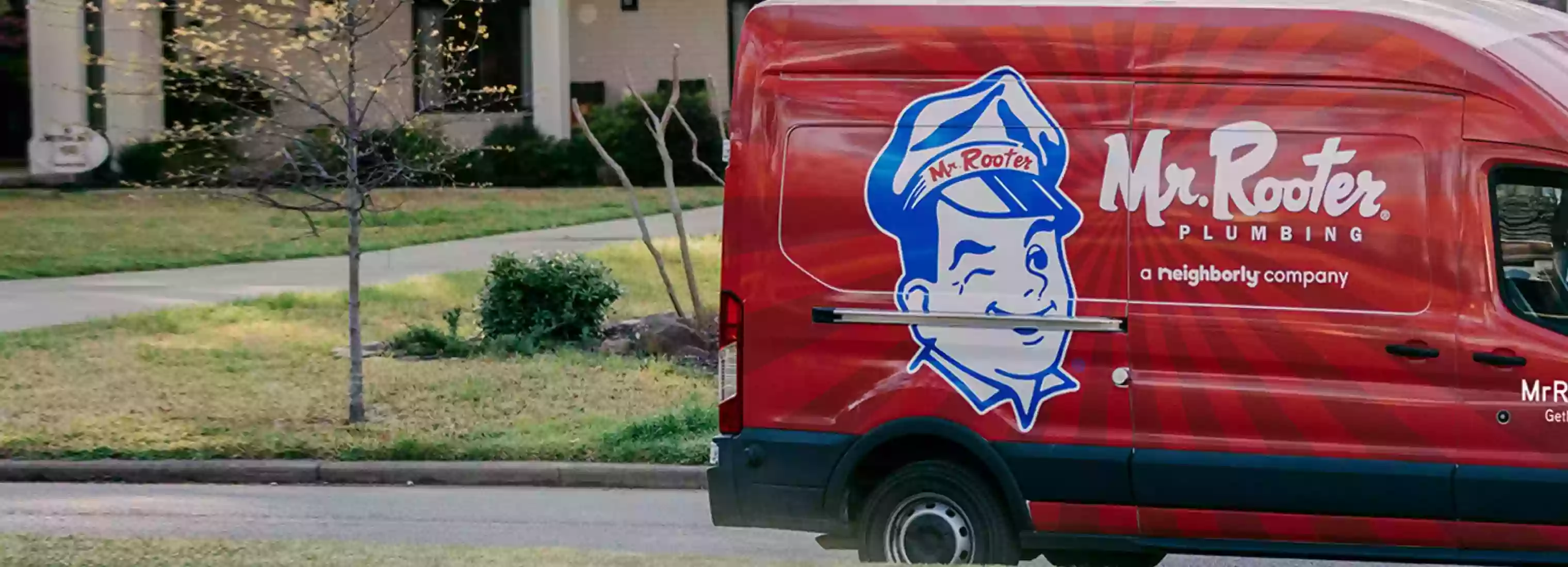Septic Tank FAQs
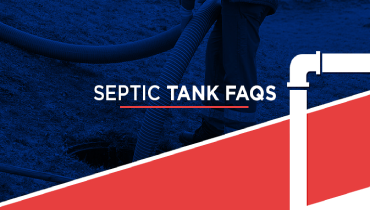
If you live in a suburban or rural area, there is a good chance you own a septic tank. You may not think very often about this vital underground system, but it is always there working hard to treat your wastewater in a safe, environmentally-friendly way.
When septic tanks malfunction, however, they can cause more than just a foul stench — they can also create a major inconvenience and lead to costly repairs. Therefore, it is important to know how to take good care of your tank and be prepared for any potential problems. To help make you more septic savvy, here is a list of our most frequently asked questions.
Are Septic Tanks Environmentally Friendly?
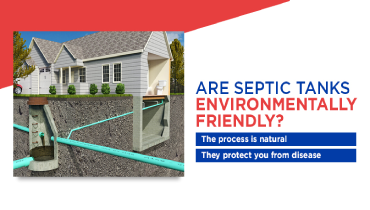
Whether you live in a rural or suburban environment, quality, on-site septic systems have several environmental benefits:
- The process is natural. Whereas many commercial treatment plants treat their waste with artificial chemicals that are often hazardous, home septic tanks rely on a process that is completely natural. The waste generated by your household gets broken down by natural bacteria, making the waste products harmless.
- They protect you from disease. Household waste products, when not properly treated, can pose a serious risk of illness to the community. Many seriously harmful diseases are spread through soil and water that is contaminated, but a properly functioning septic system can eliminate this risk and protect the community from these serious illnesses. This protection, of course, depends on the quality of the septic tank and the upkeep of the septic system — which is why it is critical that your septic tank is inspected regularly.
Where Should Septic Tanks Be Placed?

The location of your septic tank is important as it determines how well it will perform. Here are some factors to consider when deciding on the location of your tank:
- The terrain. Avoid putting your tank at the bottom of a steep hill. During a rainstorm, the water will rush downhill and may flood your tank or leach field. This could then cause your wastewater to come back into your house and cause plumbing backups. To avoid this unpleasant situation, have your tank installed on level or high ground.
- The characteristics of the soil. The soil quality can greatly affect the performance of your septic system. The soil should have a high rate of absorption because it has to absorb and treat effluent before going into the environment. Soil that is sandy and undisturbed is the most absorbent. Bedrock and soil rich in clay, on the other hand, are undesirable. Soils with rising water tables, coarse gravel and low loading rates should be avoided as well.
- The design of the land. Structures on your land, both natural and human-made, can negatively affect the drainage of your system. These areas, which include trees, buildings and water wells, should be avoided to prevent your equipment from being damaged.
How Close Can a Septic Tank Be From a Property Line?

This will vary based on your location. In New York, however, your septic tank must be located at least 10 feet from your property line.
How Long Does a Septic System Last?

The lifespan of a septic system varies widely — from 15 to 40 years. This is because there are many factors that affect a septic tank's life expectancy, including its materials and whether it has experienced damage from vehicle traffic, flooding by groundwater or clogging by roots.
The life expectancy is also affected by what type of septic system you have installed. Here are three of the most common system types and issues each system may encounter:
- Steel. Steel septic tanks will rust out with time, and factors such as the soil's acidity and the quality of the septic tank affect how quickly this process occurs. Steel septic tanks that were installed 15 or more years ago tend to be so rusted that their baffles and tank bottoms are completely gone. The covers on these septic tanks also tend to eventually rust out. All of these issues, however, can be easily identified by a professional technician during periodic inspections.
- Concrete. Septic tanks made of concrete have a considerably longer lifespan and can last anywhere from 40 years to forever, provided they were properly designed and built using high-quality materials. If a septic tank is built with poor-quality concrete in a place with acidic soil, there is a good chance the baffles and components will fail far sooner.
- Drain field. The lifespan of this system varies dramatically depending on many factors, including the size of the drain field, the percolation rate of the soil and how frequently it is used. A large, well-maintained drain field in good soil could last for over 50 years, whereas a drain field with poorly installed piping may not even last a full day.
The most effective way to increase the lifespan of your septic tank is to have it regularly serviced.
Some people think that septic tank service is just having the tank pumped, but that is just one part. While you should have your tank pumped at the intervals that are appropriate to your tank size and use, it is also essential that you have the tank inspected, during which time the technician should suggest any fixes or other maintenance.
The scum should also be removed from your tank. When your septic tank gets pumped, it is only the clear waste that is being removed. The solid scum is left behind, which can accumulate over time. To ensure the tank continues to function properly, this substance should also be removed.
In addition to regular servicing, there are a number of other factors that affect the longevity of your septic tank. While some are out of your control, there are some things you can do to prolong its lifespan:
- Design and quality. Proper installation, a well-chosen location and good soil will all improve the lifespan of your septic tank and septic system as a whole. If your tank is installed poorly, it will likely not last as long as it could otherwise. If you install your tank in a location that experiences frequent flooding, the leach field may get clogged, which will also affect its lifespan. Even a high water table or inferior soil conditions can decrease the longevity of your system.
- Material. Concrete and fiberglass tanks can last for over 40 years. Steel tanks, on the other hand, tend to rust out in considerably less time.
- Workload. How often the system is used also affects its life expectancy. Using your system less can prolong its lifespan as well as require less maintenance, which leads to significant savings.
- What goes in. You can also increase your tank's lifespan by taking care not to flush down any chemicals or non-biodegradable materials.
Can Septic Tanks Be Repaired?
They can, although the costs vary widely depending on which part of the system needs to be fixed. The tank lid, for example, is one of the least expensive parts to replace, while the drain/leach field is often one of the most expensive parts to replace. It depends especially on the size of the tank and where it's located.
Why Am I Having Issues With My Septic System When It Rains?
It is not uncommon to have septic issues when it rains. Significant precipitation can flood the soil surrounding your drain field and saturate it, making water unable to flow out of your septic tank. Because the water has nowhere to go, eventually it will flow backward through the system and up through the drains and toilets of your home. A flooded drain field can lead to other problems, such as untreated sewage seeping into the groundwater and nearby streams, which can cause severe contamination.
However, there are ways you can minimize the risk of these issues before, during and after heavy rainfall.
Before the rainfall, do the following:
- Ensure your tank is in good condition. This is the most important thing you can do to deal with an upcoming heavy rainfall. Septic problems can be much more serious if your tank has not been properly maintained or needs to be pumped.
- Divert runoff water. Make sure your runoff water is flowing away from the drain field to keep it from getting any soggier. Gutters should also drain away from the drain field.
- Do not drive over the drain field. Driving vehicles or heavy equipment may compact the soil, making it less absorbent.
During the rainfall, if your drain field is flooded or you notice that your drains are draining slowly, your toilets are making strange noises or there is water backing up into your crawlspace or basement, this means your system is under serious stress. Try to use it as little as possible until the soil around your drain field dries out. This includes skipping showers and laundry.
After the rainfall is over, you can do the following:
- Have it serviced. If you suspect that your septic system might be damaged or the water around the drain field has not receded, a professional inspection is recommended.
- Have it pumped. If silt or debris have made it into your tank, get it pumped right away. Do not open the tank until the area around it is no longer saturated.
Will Septic Tanks Freeze?
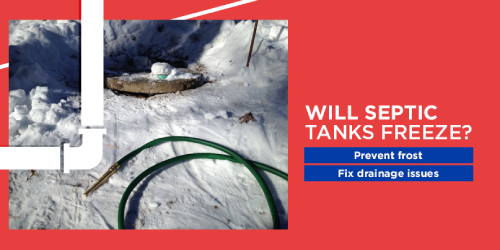
Various components of your septic tank can freeze, with the most vulnerable parts being the pipes traveling from your home to the tank. Some other components that are susceptible to freezing include your tank, the drain field and the pipes leading into it. The more often your septic system is used, the less likely you are to encounter freezing issues.
If you live in a cold climate, there are various things you can do to prevent freeze-ups:
- Prevent frost. Mulch and snow are both effective at preventing your tank and its pipes from freezing. They serve as insulating layers and prevent frost from reaching deep into the soil. Snow is effective as long as it is not greatly compacted. Compacted snow can cause frost to penetrate deep into the ground and increase the chances of a freeze-up. Avoid compacting snow around your septic tank by minimizing foot and vehicle traffic there. If your snow cover is not consistent, we recommend that you add mulch around your septic tank, especially if there is no grass or other vegetation there.
- Fix drainage issues. It is critical that you deal with any drainage issues, including leaky toilets and faucets, before the cold weather arrives. By doing so, you will conserve water and also avoid expensive repairs.
If your septic system does freeze up, hire a professional to locate the area of freezing and fix the issue. If the system cannot be immediately repaired, the tank can serve as a holding tank until the ground thaws. The is an expensive and short-term solution, but sometimes it has to be done while waiting for the appropriate equipment or weather conditions.
Below are some things you should absolutely avoid doing:
- Adding antifreeze. Salt and additives are also strongly discouraged.
- Starting a fire. Starting a fire on the ground above the tank should not be attempted.
- Running water continuously. Do not run your faucets to try to thaw frozen pipes.
Will My Septic Tank Work Without Power?
If your power goes out, the first thing you should do is conserve water as much as possible, which means taking short showers, not doing laundry and not always flushing the toilet for liquid waste. Without electricity, effluent cannot be pumped into the drain field, and the tank will fill up.
The next step you take will depend on whether your system's pump is "on demand" or has a timer:
On-Demand Pump
This system, which is the most common one, begins pumping whenever the wastewater reaches a certain level in the tank. If the power is out, then there's nothing to pump the effluent into the drain field. Throughout the power outage, wastewater will accumulate in the tank, and then it will be released all at once when the power comes back on, which can be a problem. If too much is pumped out at once, the drain field will become flooded, and complications will arise.
To avoid this problem, do the following three things:
- When the power is out, turn the pump's circuit to "off."
- When the power comes back on, turn on the pump for two minutes, then keep it off for four to six hours.
- While conserving water, continue to turn the pump on for two minutes every four to six hours. Do so until the pump automatically turns off.
Timer
If your pump system has a timer, it will control the amount of effluent that enters the drain field over a 24-hour period and will make sure the drain field does not receive more effluent than it can handle. Once your power comes back on, this system will take care of itself, although it may take a little time. So even after your power is restored, continue to conserve water so that the pump has time to catch up.
Will Bleach Harm My Septic System?
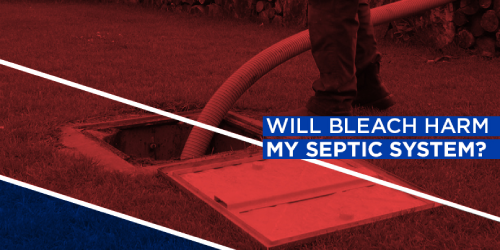
Bleach is a versatile chemical and is found in cleaners, disinfectants and countless other household products. Because it is so commonly used, it is very easy for some of it to end up in your septic tank.
The potential problem is that bleach kills bacteria — and bacteria in the septic system are responsible for breaking down and treating the waste inside. If bleach kills a septic tank's bacteria, this can cause a buildup of waste in the tank, and it will have nowhere to go. As a result, solids such as grease and oils can be pushed from the tank and into the drain field, which could lead to blockages and a complete failure of the drain field system — which in turn may cause waste to back up to your house.
The good news is that you do not have to stop using bleach to clean your house. As long as you use it in moderation, your septic system will not be thrown out of balance. By "moderation," we are referring to amounts used in a normal load of laundry, or 3/4 of a cup. If you are washing items that require bleach, spread your loads out over several days to make sure not too much bleach goes into your tank at once. Having your washing machine drain into a pipe separate from your tank is another way to avoid this problem.
We highly recommend that you use a septic tank treatment product to replace the bacteria that the bleach has killed.
Why Is My Septic Tank Alarm Going Off?

If you hear an alarm going off from your septic system, there is obviously something wrong. You can check it yourself, but if you do not feel comfortable doing that, we recommend that you hire a professional.
If your septic system is conventional, meaning it does not include an aeration device, an alarm usually indicates there is a high water level. High water levels are typically due to one of three factors:
- Clogging of your tank's effluent filter
- Failure of your submersible pump or the float that controls it
- Failure of the leach field or clogging of the outlet line
Many people incorrectly believe that a high-level alarm means the tank needs to be pumped. While pumping the tank may cause the alarm to stop, chances are that pumping will not resolve the issue, and the alarm will sound again the next time the tank fills up.
Can Septic Fumes Be Harmful?
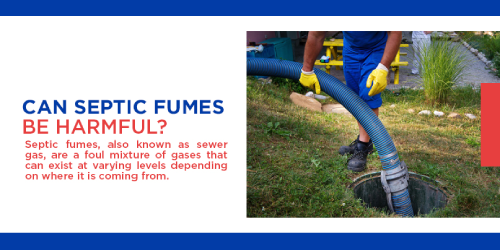
Septic fumes, also known as sewer gas, are a foul mixture of gases that can exist at varying levels depending on where it is coming from. Some of these gases are toxic, and others are not. They are formed when household waste decays, which is most commonly the anaerobic decomposition of sludge and sewage.
Although septic fumes consist mostly of the odorless gas methane, it usually includes other gases such as carbon dioxide, ammonia, sulfur dioxide, nitrogen and hydrogen. In confined spaces, methane gas can replace oxygen, which can be lethal.
Hydrogen sulfide is a product of decomposing organic material and can result from both human and animal waste. Under normal conditions, it is flammable and colorless, and when present at low levels, its odor is similar to that of rotten eggs. Sewer gas, in addition to smelling awful, can also pose hazards, especially over longer periods.
Luckily, it is not harmful at the concentrations that are found in a home with septic odor problems. There is simply not enough gas generated to approach dangerous levels, and we can easily detect it as well. At higher concentrations, however, our noses can become overwhelmed, and it becomes difficult for us to smell it. At these levels, hydrogen sulfide gas is toxic and could be fatal.
If you were to go in a hole, tunnel or tank with sewage that was undergoing anaerobic breakdown — which occurs in your septic tank — you could be poisoned, and the consequences may even be fatal. Do not enter your septic tank under any circumstances. If the need arises, leave this potentially dangerous task to trained professionals.
If you do smell sewer gas on your property, this means the plumbing lines are not functioning properly in a certain area. One common source of septic fumes is a "dry trap." All drains that go to a sewer system feature a P-shaped trap that is typically filled with water. This provides a seal to keep the sewer gases from coming out. The term dry trap refers to the situation where the water in the trap evaporates after sinks, showers, toilets and floor drains are not used for long periods. Dry traps are easy to fix, however. Just pour about a quart of water down your pipes to ensure the drain traps refill with water.
Another common source of septic fumes is when the sewer drain line breaks or leaks, allowing the gases to travel into your basement or crawl space, and then up into your home. Sewer gases can also back up into your home if a drain gets clogged or if a blockage occurs at your septic tank. Fixing these problems is not simple and should be left to a professional.
Go With Syracuse's Most Trusted Plumbing Services

If you live in or around the Syracuse, NY area and are in need of plumbing services, choose Mr. Rooter Plumbing of Greater Syracuse. You can reach us at any time of day or night, or you can book an appointment online. From minor drain problems to emergency pipe repair, our licensed plumbing experts are certified by Onondaga Country for all plumbing-related projects and will solve your issues with permanent solutions, high-quality parts and superior customer service.
 Click to call
Click to call
